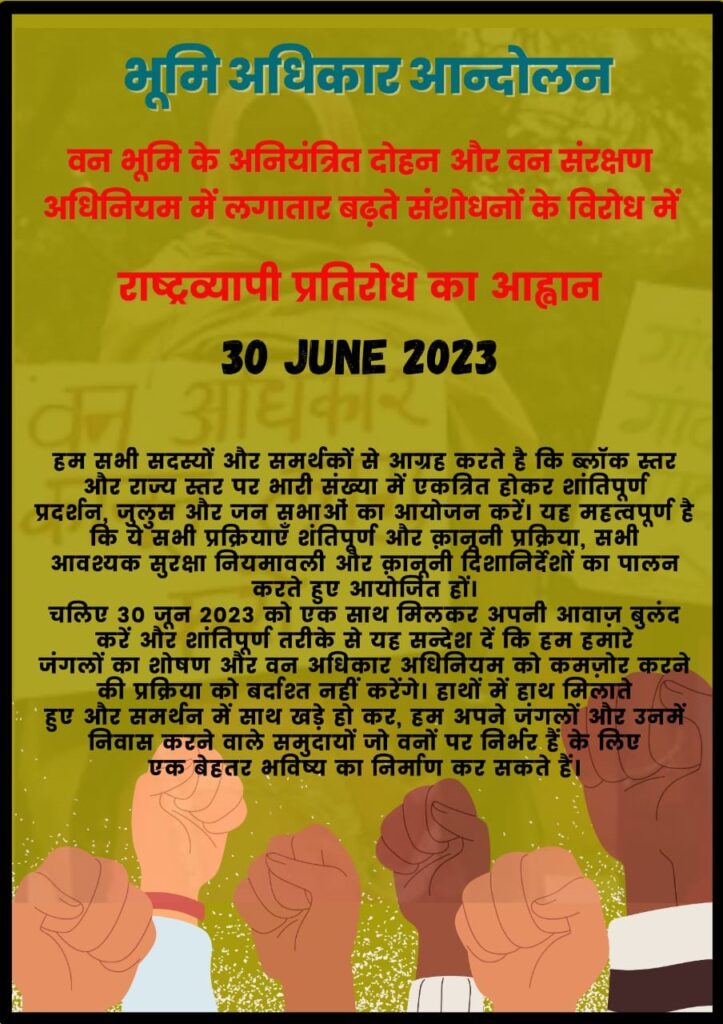Speaking from one of such protest gathering today, activist and member of the BAA coalition, Hannan Mollah spoke of how the protest was successfully being conducted as he spoke in almost all states where there were tribal regions. Speaking to SabrangIndia, he asserted “We at the BAA condemn the attempt of the government to amend the Forest Conservation Act and to capture the forest land for the interest of the corporate sector.”
The call given by the Bhumi Adhikar Andolan (BAA) has essentially sought to mobilise individuals, organisations, and communities to stand up against the exploitation of forests and demand the preservation of the Forest Rights Act. By joining hands and standing in solidarity, the participants hope to send a powerful message that the process of weakening the forests and the Forest Rights Act will not be tolerated.
The appeal from the Bhumi Adhikar Andolan has garnered significant attention and support from various quarters. It highlights the crucial role of community activism in protecting our natural resources and preserving the rights of forest-dependent communities. Today’s demonstration has been slated to be a unified display of solidarity, aimed at safeguarding our forests and ensuring a better future for all.
Says Zuheib, from the secretariat of the BAA, ‘the protest has been conducted all over India.’ In fact, the day of call has coincided with Hul Diwas, which has in turn strengthened the protests further. The protests have been particularly strong in states such as Jharkhand, Chattisgarh, and Odisha, where land and forest rights have been particularly vulnerable and jeopardised. Celebrations of Hul Diwas have permeated the protests, and thus people in masses from states like Jaunpur, in Uttar Pradesh, Assam, and Tamil Nadu, have also risen in solidarity.

Stating that the all-India protests were a huge success, Zuheib said that the existing democracy that the FRA 2006 sought to establish and uphold is being diluted by this new amendment.
At the culmination of the protest, in several places, the organisers gave a document with notes, observations and criticisms of the new amendment to the Forest Officials and the District Magistrates in Halyala, Karnataka.
The twitter handle of the CPI-M’s All India Kisan Sabha (AIKS) also part of the platform, has Tamil Nadu Tribal Association protests in Attur demanding grant of forest rights.

The protests are demanding that the government retract a proposed legislation aimed at amending the Forest Conservation Act. The platform argues that this bill, if implemented, would have dire consequences on the rights of local tribal communities and their livelihoods. The protesters emphasised the need for immediate action from the authorities in order to address this pressing issue.
In a meeting organised by the Bhumi Adhikar Andolan at the Delhi office of the All India Forest Workers Union, the BAA talked about the indiscriminate exploitation of forest land across the country and how it is causing severe damage to the environment and ecology, while at the same time forcibly displacing tribal communities traditionally dependent on the forest. The BAA forwarded that if timely action is not taken, the Forest Rights Act (FRA) 2006, achieved through immense hard work and struggle, will be weakened significantly.
The Bhumi Adhikar Andolan, a coalition of grassroots organizations dedicated to championing the rights of indigenous peoples, farmers, and ecological conservation for the past decade, has issued a call for a nationwide demonstration. The purpose of this protest is to raise collective voices against the exploitation of forest lands and to denounce the regressive proposed amendments that threaten these vital ecosystems.

Representatives of the Bhumi Adhikar Andolan (BAA) issued an appeal to all community organizations, urging them to come together on June 30, 2023, and raise their voices collectively in a peaceful manner to send a resounding message that they will not tolerate the exploitation of forests and the process of weakening the FRA 2006 Standing together in solidarity and support, we can build a better future for the communities dependent on forests and create a sustainable environment. The BAA representatives spoke of the urgent need to protecting natural resources and ensuring the rights of forest-dependent communities. The appeal resonates with the urgent need to safeguard the ecological balance and preserve the traditional livelihoods associated with the forests.
The platform has analysed the proposed amendments and state that these amendments not only jeopardize the hard-won Forest Rights Act of 2006 but also grant excessive exemption powers to the central government, resulting in detrimental control over forest lands. Furthermore, the amendments dilute the authority of Gram Sabhas, undermining local-level initiatives for biodiversity conservation, contravening constitutional provisions, and impeding the recognition of forest rights and community decision-making processes. The concerns raised by these proposed amendments have ignited a pressing demand for protest.
What is the Forest Conservation (Amendment) Bill all about?
The Forest (Conservation) Amendment Bill of 2023 was introduced in the Lok Sabha on Wednesday, prompting objections and concerns from various quarters. Congress MP Jairam Ramesh raised the primary objection, expressing dissatisfaction with the bill being referred to a select committee of the Parliament in Lok Sabha instead of the parliamentary standing committee on science, technology, environment, and forest, which he chairs. Ramesh alleged that the intentional referral to the select committee, headed by an MP chosen by the Prime Minister, bypassed a more comprehensive examination of the legislation with the involvement of all stakeholders.
One of the key provisions of the bill introduces criteria that would result in a significant portion of forest land being exempted from the Forest (Conservation) Act. This exemption exposes the land for government use and non-forest purposes. Moreover, the inclusion of the clause stating “any other like purposes, which the Central Government may, by order, specify” grants broad powers to the Central government to modify these exemptions as needed, bypassing the legislative process, and delegating such critical decisions.
Critics have voiced concerns over the consequences of these amendments, asserting that they promote the commercialization of Reserve Forests and cause irreversible disturbances to wildlife.
In summary, the introduction of the Forest (Conservation) Amendment Bill has drawn objections over the selection of the reviewing committee and the exemptions provided, which can potentially lead to the exploitation of forest lands for non-forest purposes. These concerns highlight the need for a thorough examination of the bill and its potential implications.
Related:
How a battle is being waged within India’s forests, for rights over land and resources
Forest Conservation Bill 2023: too many exemptions, discretion to Centre
Adivasi and other farmers under the AIKS bring Maharashtra govt to its feet
Minister inquires about implementation of FRA in states, MoTA dodges any accountability



